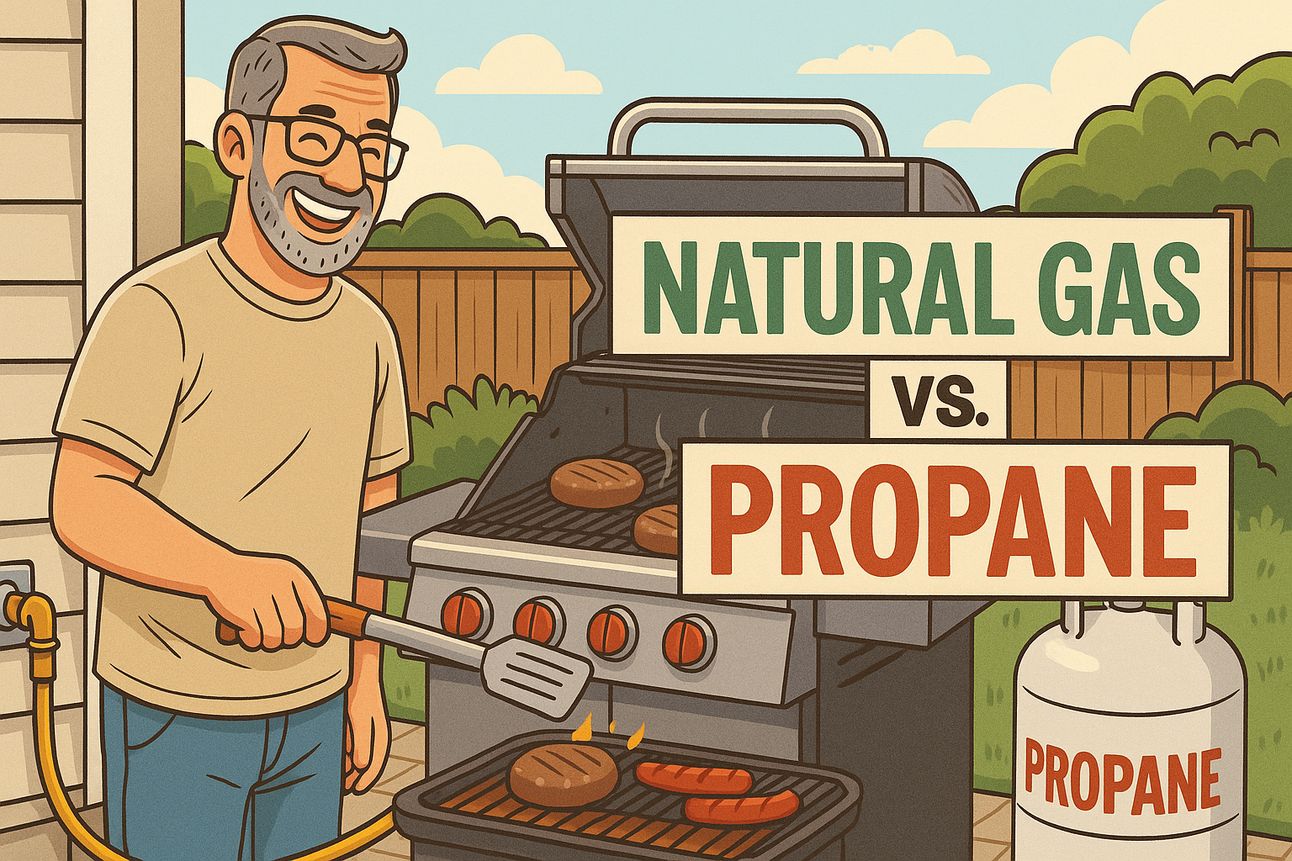Propane vs. Natural Gas: What’s Best for Your Backyard BBQ?
You’re halfway through grilling burgers, the game’s on inside, drinks are flowing—and then… psssshhhht. Silence. Your propane tank just waved the white flag.
Sound familiar?
If you’ve ever run out of gas mid-cookout, you’ve probably muttered a few colorful words and maybe even asked yourself: Is it finally time to switch to natural gas?
Well, my friend, let’s settle this backyard debate once and for all.
Maintenance Minute BBQ Edition
Where Small Fixes Make a Big Difference!
This Weeks 5 Minute Focus
Clean you BBQ grill grates
Inspect gas lines and connections
Empty the grease trap
Give your BBQ a full cleaning
🔧 Pro Tip: Give Your Grill the Spa Day It Deserves
Once or twice a season, treat your BBQ to a full deep clean—because even the hardest-working grill needs a little TLC. Disconnect the gas, remove the grates, burners, and grease tray, then scrub every greasy nook with warm soapy water and a degreaser. Don’t forget to check burner holes for clogs and give the exterior a wipe-down while you're at it.
A clean grill runs hotter, safer, and doesn’t make your ribs taste like last month’s salmon.
Take the bite out of rising vet costs with pet insurance
Veterinarians across the country have reported pressure from corporate managers to prioritize profit. This incentivized higher patient turnover, increased testing, and upselling services. Pet insurance could help you offset some of these rising costs, with some providing up to 90% reimbursement.
🛢️ The Tale of Two Gasses
Propane and natural gas are both great options for outdoor grilling. They both get hot, cook your food, and—when used correctly—don’t blow up your patio. But they’re not created equal, and choosing the right one depends on your setup, budget, and how serious you are about your backyard BBQ game.
Let’s break it down.

Natural Gas vs Propane
🔍 Propane: The Tank Boss
Pros:
Portable. Take it camping, tailgating, or to the cabin.
Hotter flame per cubic foot = faster cooking.
Easy to set up—no plumber or permit required.
Cons:
You will run out at the worst possible time.
Costs more over time.
You’re stuck refilling or swapping tanks (usually when the store’s closed).
🔌 Natural Gas: The Never-Empty Option
Pros:
Always available (if your home has a natural gas line).
Cheaper in the long run.
More environmentally friendly—burns cleaner.
No tanks to refill. Ever.
Cons:
Requires professional installation.
Upfront cost for hookup or new BBQ.
Less portable (read: not portable at all).
🧰 What You Need to Make the Switch
Thinking about joining Team Natural Gas? Here’s what you’ll need:
Access to a natural gas line – Often available if your home has gas appliances.
A natural gas BBQ or a conversion kit for your existing grill (check your model first).
A licensed gas fitter to run the line and install a shutoff valve. (Don’t DIY this unless you really like fire trucks.)
Bonus Tip: Ask for a quick-connect fitting during installation. It makes disconnecting your grill for cleaning or winter storage way easier.
🧠 Pro Insight: What Most People Don’t Consider
A lot of folks forget this: natural gas isn’t as hot as propane—so if you’re all about the sear, it might take a little longer to get that steakhouse char.
But for most backyard chefs? The difference is barely noticeable, and the convenience of never running out of fuel is worth its weight in sirloin.
💵 The Cost Breakdown
Propane: ~$25–$35 per 20 lb tank (lasts about 8–10 hours of grilling)
Natural Gas Setup: $300–$1,000 upfront (line, labor, parts), but fuel costs are roughly 1/6 the price of propane
Costs are approximate and depending on your location
If you grill often, you’ll break even in a couple of summers. Plus, no more late-night propane runs in flip-flops.
🧯 Safety First
Whichever route you go, remember:
Check for leaks regularly.
Keep your grill at least 3 feet away from walls and fences.
Never grill under an overhang (unless you like black soot stains and melted vinyl).
🔚 Final Verdict: Should You Switch?
If you:
Grill a lot
Already have natural gas at home
Hate refilling tanks
👉 Then yes, natural gas is absolutely worth it.
If you:
Move your BBQ around
Only grill occasionally
Don’t have gas access
👉 Then stick with propane and keep a spare tank on standby. (Trust me—future you will thank you.)
Q&A- Can I convert my existing propane BBQ to natural gas?
Answer:
In many cases, yes—but not all. Some propane grills are built to be convertible using a specific manufacturer-approved conversion kit. Others aren’t designed to handle natural gas at all. Always check your BBQ’s user manual or contact the manufacturer before attempting a conversion.
How did you like today's newsletter?
Questions? Comments? Drop us a line at [email protected]
This email may contains affiliate links, which means I may earn a commission if you make a purchase using these links.


